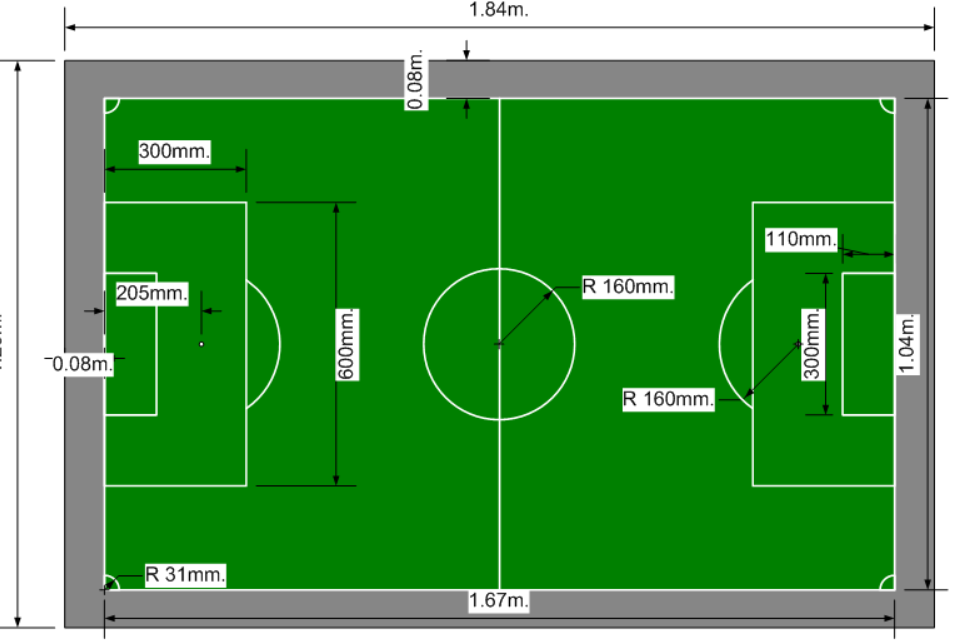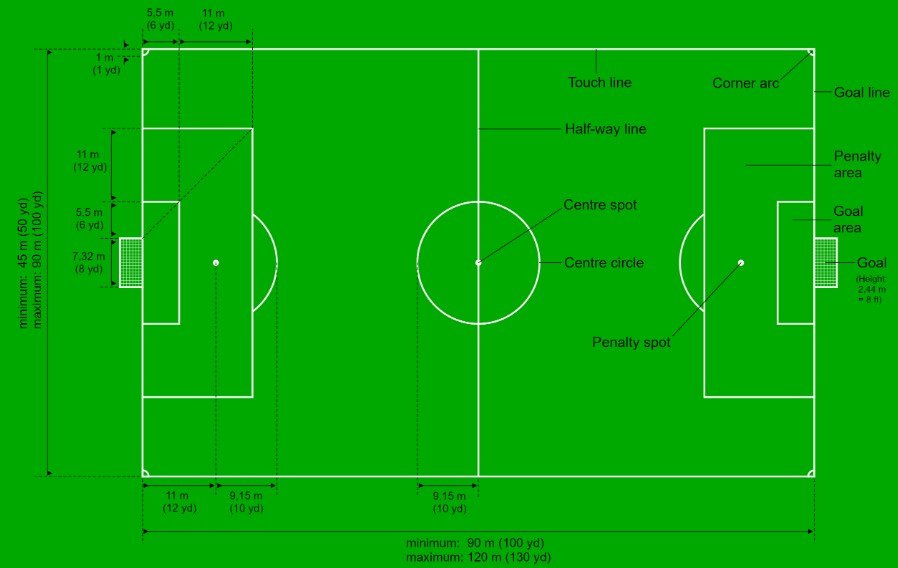Is a Soccer Field Bigger Than a Football? Yes, a soccer field is bigger than a football field. Soccer fields have larger dimensions compared to football fields.
Soccer and football fields vary in size and are designed to accommodate the specific rules and gameplay of each sport. Understanding the differences in field dimensions is essential for players, coaches, and fans alike. Soccer fields are typically larger, measuring between 100 and 130 yards in length and 50 and 100 yards in width.
In contrast, football fields are shorter, with a length of 100 yards and a width of 53 1/3 yards. These distinctions impact the way each game is played, emphasizing the importance of field size in both soccer and football. Moreover, the unique characteristics of each field contribute to the distinct strategies and dynamics of the sports.
Table of Contents
Soccer Field Bigger Than a Football

Soccer fields are meticulously designed with specific measurements to ensure fair play and optimal gameplay. Let’s explore the dimensions of a standard soccer field.
Length and Width
The length of a soccer field typically ranges between 100 and 130 yards, while the width falls between 50 and 100 yards.
Goal Size
- The goal width is approximately 8 yards, and the height is around 8 feet.
- The penalty area extends 18 yards from the goal line and 18 yards into the field.
- The penalty spot is 12 yards away from the goal line.
Dimensions of Football Field
The dimensions of a football field play a crucial role in the game, determining the space in which the players compete. The size of the field impacts the strategies, gameplay, and overall dynamics of the sport. Understanding the specific measurements of a football field provides valuable insight into the sport and its requirements.
Length and Width
The length and width of a football field are essential components that define the playing area. The standard dimensions of a football field are:
- Length: 120 yards (360 feet)
- Width: 53.3 yards (160 feet)
End zone Size
The end zone size is a critical aspect of the football field, serving as the scoring area for players. The standard dimensions of the end zone are:
- Depth: 10 yards (30 feet)
- Width: The same width as the rest of the field, spanning 53.3 yards (160 feet)
Key Differences
A soccer field is typically larger than a football field, with differences in dimensions. While both sports have global popularity, soccer is widely embraced internationally, while American football maintains a strong following primarily in the U.S.
Key Differences When comparing soccer and football, one of the most noticeable differences is the size of the playing area. In this section, we will dive into the key differences between the two sports in terms of playing area size and field markings. Playing Area Size Soccer fields are generally larger than football fields. According to FIFA regulations, a soccer field must measure between 100 and 130 yards in length and 50-100 yards in width. In contrast, an American football field is 100 yards in length and 160 feet (53.3 yards) in width. Therefore, a soccer field can be up to 30 yards longer and 10 yards wider than a football field.
Soccer Field vs. football Field Overlay
A soccer field is typically larger than a football field. While both fields have similar lengths, a soccer field is wider, with dimensions ranging from 50-100 yards wide and 100-130 yards long.

Impact on Gameplay
In soccer, the larger field allows for more running and strategic gameplay. Players have to cover more ground.
On the other hand, football fields are smaller, promoting quick plays and intense physical contact among players.
Size Comparison
Let’s compare the dimensions of a standard soccer field to that of a football field:
| Field Type | Length | Width |
|---|---|---|
| Soccer Field | 100-110 yards | 50-100 yards |
| Football Field | 120 yards | 53.3 yards |
As we can see, soccer fields have a wider range of dimensions compared to football fields.
- Soccer fields offer more space for movement and passing.
- Football fields are designed for short, high-intensity plays.
Overall, the size difference between a soccer field and a football field significantly impacts the style of play in each sport.
Spectator Experience
A soccer field is larger than a football field. The dimensions of a standard soccer field are around 100–130 yards long and 50–100 yards wide, while a football field is approximately 120 yards long and 53–3 yards wide. This size difference affects the spectator experience and playing style of each sport.
Viewing Differences
The spectator experience at a soccer field versus a football field is notably distinct. When attending a soccer match, spectators are immersed in a continuous and dynamic game flow as the players navigate the expansive field. The larger size of the soccer field allows for extended ball movement and strategic plays, captivating the audience with the fluidity and energy of the game. On the other hand, football games often feature more frequent pauses and concentrated action due to the shorter field dimensions. The spectator’s vantage point and overall engagement differ significantly between these two sports.
Comparative Atmosphere
At a soccer field, the vast expanse of the playing area creates a sense of grandeur and openness, enhancing the overall viewing experience. Spectators feel connected to the game’s rhythm and the players’ movements on the expansive field. In contrast, football fields, being smaller in size, can create a more intimate and intense atmosphere, with fans feeling closer to the action and the players. The distinct atmospheres in each type of field contribute to unique and diverse experiences for sports enthusiasts.
Maintenance and Costs
Field Upkeep
Proper maintenance of a soccer field and a football field is essential to ensuring the safety and performance of the players. Both types of fields require regular mowing, fertilization, and irrigation to keep the turf healthy and in good condition. Additionally, the soccer field demands specific attention to the goal areas, as they are subjected to more wear and tear. In contrast, the football field requires meticulous marking and maintenance of the yard lines and end zones.
Financial Considerations

When it comes to the financial aspect, the maintenance costs for a soccer field are generally higher than those for a football field. The larger size of a soccer field means that it requires more material for maintenance, such as fertilizers, irrigation, and turf supplies. Moreover, the goal areas in a soccer field need extra care and attention, which adds to the overall maintenance costs. On the other hand, the maintenance costs for a football field are lower due to its smaller size and less demanding maintenance requirements.
Conclusion
Soccer fields are indeed larger than football fields, offering more space for gameplay. The dimensions play a crucial role in the dynamics of each sport, providing unique challenges and strategies. Understanding the size difference enhances appreciation for the intricacies of both soccer and football.

